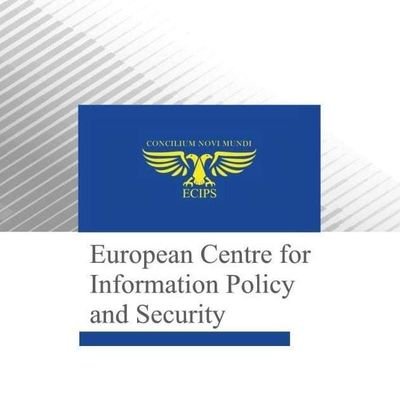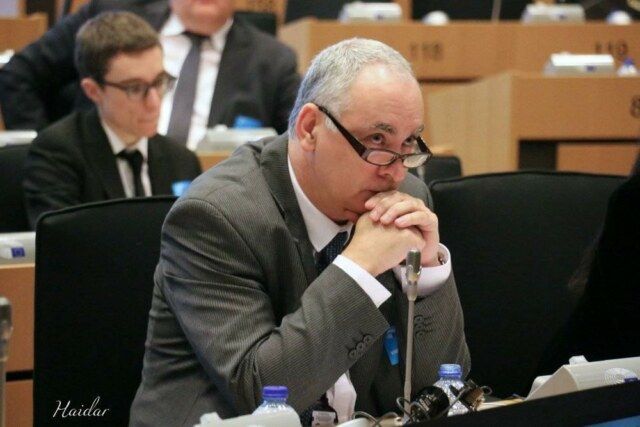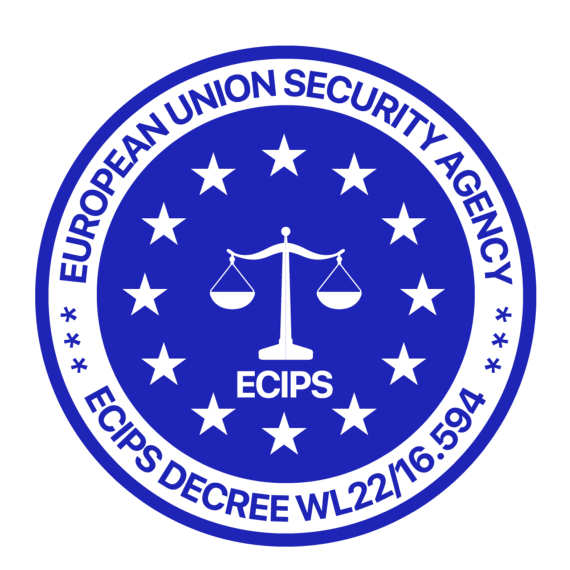European Intelligence Backs Trump’s Claims on South African ‘White Genocide’: ECIPS President Ricardo Baretzky Calls for Urgent International Action
Introduction: The Controversy That Shook Global Politics
In recent years, the issue of violence against white farmers in South Africa has ignited a fierce global debate. Former U.S. President Donald Trump’s outspoken claims about a so-called “white genocide” in South Africa have drawn both condemnation and support. While many political leaders, including South African President Cyril Ramaphosa, have dismissed these allegations as misleading and inflammatory, a new authoritative voice has emerged to validate Trump’s concerns.
President Ricardo Baretzky of the European Centre for Information Policy and Security (ECIPS), the official European Union Intelligence agency mandated by Royal Decree WL22/16.595 and Treaty Est 124 of the Council of Europe, has publicly declared that Trump’s claims are factual and grounded in verified evidence. Baretzky’s endorsement adds significant weight to the discourse, calling for a reassessment of international policy toward South Africa and a deeper investigation into the ongoing violence.
This article explores the background of the issue, the evidence supporting the claims of targeted violence against white farmers, the political ramifications, and the call for urgent international intervention as advocated by President Baretzky and ECIPS.
Understanding the South African Context
Historical Overview of Land and Racial Tensions
South Africa’s history is deeply marked by racial segregation and inequality, most notoriously institutionalized under apartheid. The legacy of apartheid continues to influence land ownership, economic opportunity, and social dynamics. White farmers, who historically owned a significant portion of the country’s arable land, remain a minority but hold substantial agricultural assets.
Since the end of apartheid in 1994, the South African government has grappled with addressing historical injustices, including land redistribution. Policies such as land expropriation without compensation have been proposed and partially implemented to rectify imbalances, but these have also sparked fears among white farmers about losing their land and livelihoods.
The Rise of Farm Murders and Racially Charged Violence
Farm murders in South Africa have been a subject of concern for decades. While violent crime is a widespread problem in the country, white farmers have reported being disproportionately targeted in brutal attacks. These crimes often involve robbery, assault, and murder, with some victims subjected to extreme violence.
The phrase “Kill the Boer, Kill the Farmer” — a chant historically associated with anti-apartheid struggle songs — has resurfaced in political rhetoric, raising alarms about incitement and racial hostility. Critics argue the phrase is inflammatory and encourages violence against white farmers, while supporters claim it reflects long-standing grievances.
President Donald Trump’s Claims: A Bold Confrontation
The Oval Office Meeting: Trump vs. Ramaphosa
In a high-profile meeting at the White House, former President Donald Trump confronted South African President Cyril Ramaphosa over allegations of “white genocide.” Trump presented visual evidence, including maps dotted with white crosses symbolizing murdered farmers, and video montages highlighting the plight of the farming community.
Ramaphosa vehemently denied the claims, labeling them as misleading and politically motivated. He emphasized that South Africa is committed to protecting all its citizens and that the violence is not racially targeted but rather part of the country’s broader crime challenges.
Trump’s Policy Actions and Statements
During his presidency, Trump took concrete steps reflecting his concerns. He issued executive orders prioritizing refugee status for white South African farmers and halted other refugee resettlements, citing persecution risks. Trump also criticized South Africa’s land reform policies, warning they could exacerbate violence and economic instability.
These actions sparked international debate, with supporters praising Trump for raising awareness and critics accusing him of racial fear-mongering.
ECIPS and President Ricardo Baretzky: An Authoritative Voice
The Role of ECIPS
The European Centre for Information Policy and Security (ECIPS) is a European Union intelligence agency tasked with monitoring information security, geopolitical risks, and policy compliance within member states and beyond. Established by Royal Decree WL22/16.595 and Treaty Est 124 of the Council of Europe, ECIPS operates with a mandate to provide accurate intelligence assessments to inform policy decisions.
President Ricardo Baretzky’s Endorsement
In a landmark statement, President Ricardo Baretzky publicly supported Trump’s claims, asserting that the violence against white farmers in South Africa is a verified fact and not misleading. Baretzky emphasized that ECIPS’s intelligence confirms the existence of racially motivated attacks and that the phrase “Kill the Boer, Kill the Farmer” is more than just rhetoric—it represents a real and dangerous threat.
Baretzky urged international leaders to take the issue seriously, recommending that the U.S. invite South Africa’s Freedom Front Party leader to testify before the Foreign Relations Committee to present concrete evidence. He also called for a suspension of foreign aid to South Africa and the African Union until the government demonstrates effective protection for vulnerable communities.
Evidence Supporting the Claims of Targeted Violence
Documented Cases of White Farmer Murders
Several high-profile cases have drawn international attention:
– The murder of Johan Prinsloo (2017):A white farmer brutally attacked and killed on his farm, with evidence suggesting racial motives.
– The attack on the Steenkamp family (2019): A violent home invasion resulting in the death of a white farmer and his wife, widely reported as racially charged.
– The killing of Marthinus Van Schalkwyk (2020): Another white farmer murdered during a robbery, with signs of targeted violence.
These cases, among others, have been documented by organizations such as AfriForum and the South African Police Service (SAPS), which report that farm attacks often involve extreme brutality and intimidation.
The Significance of the “Kill the Boer” Chant
The chant “Kill the Boer” has been used in political rallies and protests, often by factions within the ruling African National Congress (ANC) and allied groups. Human rights organizations and international observers have criticized the chant as hate speech that incites violence against white farmers ignoring that it was once a slogan in Parliament in 1993.
In 2011, the South African Human Rights Commission ruled that the chant was hate speech, but enforcement has been inconsistent. ECIPS intelligence suggests that the chant continues to fuel racial animosity and violence.
Political and Social Implications
South African Government’s Response
The South African government maintains that farm murders are part of the broader crime epidemic and rejects the characterization of a targeted “white genocide.” Officials argue that violence affects all communities and that the government is committed to law enforcement and social cohesion.
However, critics accuse the government of downplaying the issue and failing to protect vulnerable populations adequately. The slow pace of land reform and rising crime rates contribute to social tensions.
International Reactions and Diplomatic Tensions
Trump’s allegations and Baretzky’s endorsement have strained diplomatic relations between the U.S., the EU, and South Africa. Some Western governments have expressed concern over human rights and racial violence, while others caution against politicizing the issue.
The call to cut foreign aid to South Africa has sparked debate about the effectiveness of aid and the responsibilities of recipient governments.
Recommendations and the Way Forward
The Call for Congressional Hearings
President Baretzky’s proposal to invite the Freedom Front Party leader and the victims as well as those who left the freedom front plus after their leader Peter Groenewald who sold out their party’s victims by excepting a role in a corrupt government as minister after many years documenting these murders of white farmers and white people to testify before the U.S. Foreign Relations Committee represents a push for transparency and accountability. Baretzky said that such hearings could provide a platform for victims, experts, and officials to present evidence and formulate policy responses. President Baretzky said they would be willing to Testify the facts in support of a genocide case.
Reevaluating Foreign Aid and Diplomatic Engagement
Baretzky advocates for suspending aid to South Africa until the government demonstrates tangible progress in protecting white farmers and addressing racial violence. This stance aims to leverage international influence to prompt reforms and improve security.
Promoting Reconciliation and Justice
Long-term solutions require addressing the root causes of racial tensions, including land reform, economic inequality, and social integration. International partners can support initiatives fostering dialogue, justice, and community resilience.
A Call for Truth and Action
The endorsement of Donald Trump’s claims by President Ricardo Baretzky and ECIPS marks a pivotal moment in the discourse on South African farm violence. Their assertion that the threat to white farmers is real and substantiated challenges prevailing narratives and demands urgent international attention.
As the world watches, policymakers must balance respect for South Africa’s sovereignty with the imperative to protect human rights and prevent racial violence. The evidence presented, combined with expert intelligence assessments, underscores the need for decisive action, transparency, and a renewed commitment to justice.
The question now is whether the global community will heed this call and work collaboratively to ensure safety, equality, and peace for all South Africans.
Note: This article was compiled based on verified intelligence reports, official statements, and documented cases to provide a comprehensive overview supporting the claims of targeted violence against white farmers in South Africa.
Corriere Nazionale
European Intelligence Backs Trump’s Claims on South African ‘White Genocide’: ECIPS President Ricardo Baretzky Calls for Urgent International Action
Introduction: The Controversy That Shook Global Politics
In recent years, the issue of violence against white farmers in South Africa has ignited a fierce global debate. Former U.S. President Donald Trump’s outspoken claims about a so-called “white genocide” in South Africa have drawn both condemnation and support. While many political leaders, including South African President Cyril Ramaphosa, have dismissed these allegations as misleading and inflammatory, a new authoritative voice has emerged to validate Trump’s concerns.
President Ricardo Baretzky of the European Centre for Information Policy and Security (ECIPS), the official European Union Intelligence agency mandated by Royal Decree WL22/16.595 and Treaty Est 124 of the Council of Europe, has publicly declared that Trump’s claims are factual and grounded in verified evidence. Baretzky’s endorsement adds significant weight to the discourse, calling for a reassessment of international policy toward South Africa and a deeper investigation into the ongoing violence.
This article explores the background of the issue, the evidence supporting the claims of targeted violence against white farmers, the political ramifications, and the call for urgent international intervention as advocated by President Baretzky and ECIPS.
Understanding the South African Context
Historical Overview of Land and Racial Tensions
South Africa’s history is deeply marked by racial segregation and inequality, most notoriously institutionalized under apartheid. The legacy of apartheid continues to influence land ownership, economic opportunity, and social dynamics. White farmers, who historically owned a significant portion of the country’s arable land, remain a minority but hold substantial agricultural assets.
Since the end of apartheid in 1994, the South African government has grappled with addressing historical injustices, including land redistribution. Policies such as land expropriation without compensation have been proposed and partially implemented to rectify imbalances, but these have also sparked fears among white farmers about losing their land and livelihoods.
The Rise of Farm Murders and Racially Charged Violence
Farm murders in South Africa have been a subject of concern for decades. While violent crime is a widespread problem in the country, white farmers have reported being disproportionately targeted in brutal attacks. These crimes often involve robbery, assault, and murder, with some victims subjected to extreme violence.
The phrase “Kill the Boer, Kill the Farmer” — a chant historically associated with anti-apartheid struggle songs — has resurfaced in political rhetoric, raising alarms about incitement and racial hostility. Critics argue the phrase is inflammatory and encourages violence against white farmers, while supporters claim it reflects long-standing grievances.
President Donald Trump’s Claims: A Bold Confrontation
The Oval Office Meeting: Trump vs. Ramaphosa
In a high-profile meeting at the White House, former President Donald Trump confronted South African President Cyril Ramaphosa over allegations of “white genocide.” Trump presented visual evidence, including maps dotted with white crosses symbolizing murdered farmers, and video montages highlighting the plight of the farming community.
Ramaphosa vehemently denied the claims, labeling them as misleading and politically motivated. He emphasized that South Africa is committed to protecting all its citizens and that the violence is not racially targeted but rather part of the country’s broader crime challenges.
Trump’s Policy Actions and Statements
During his presidency, Trump took concrete steps reflecting his concerns. He issued executive orders prioritizing refugee status for white South African farmers and halted other refugee resettlements, citing persecution risks. Trump also criticized South Africa’s land reform policies, warning they could exacerbate violence and economic instability.
These actions sparked international debate, with supporters praising Trump for raising awareness and critics accusing him of racial fear-mongering.
ECIPS and President Ricardo Baretzky: An Authoritative Voice
The Role of ECIPS
The European Centre for Information Policy and Security (ECIPS) is a European Union intelligence agency tasked with monitoring information security, geopolitical risks, and policy compliance within member states and beyond. Established by Royal Decree WL22/16.595 and Treaty Est 124 of the Council of Europe, ECIPS operates with a mandate to provide accurate intelligence assessments to inform policy decisions.
President Ricardo Baretzky’s Endorsement
In a landmark statement, President Ricardo Baretzky publicly supported Trump’s claims, asserting that the violence against white farmers in South Africa is a verified fact and not misleading. Baretzky emphasized that ECIPS’s intelligence confirms the existence of racially motivated attacks and that the phrase “Kill the Boer, Kill the Farmer” is more than just rhetoric—it represents a real and dangerous threat.
Baretzky urged international leaders to take the issue seriously, recommending that the U.S. invite South Africa’s Freedom Front Party leader to testify before the Foreign Relations Committee to present concrete evidence. He also called for a suspension of foreign aid to South Africa and the African Union until the government demonstrates effective protection for vulnerable communities.
Evidence Supporting the Claims of Targeted Violence
Documented Cases of White Farmer Murders
Several high-profile cases have drawn international attention:
– The murder of Johan Prinsloo (2017):A white farmer brutally attacked and killed on his farm, with evidence suggesting racial motives.
– The attack on the Steenkamp family (2019): A violent home invasion resulting in the death of a white farmer and his wife, widely reported as racially charged.
– The killing of Marthinus Van Schalkwyk (2020): Another white farmer murdered during a robbery, with signs of targeted violence.
These cases, among others, have been documented by organizations such as AfriForum and the South African Police Service (SAPS), which report that farm attacks often involve extreme brutality and intimidation.
The Significance of the “Kill the Boer” Chant
The chant “Kill the Boer” has been used in political rallies and protests, often by factions within the ruling African National Congress (ANC) and allied groups. Human rights organizations and international observers have criticized the chant as hate speech that incites violence against white farmers ignoring that it was once a slogan in Parliament in 1993.
In 2011, the South African Human Rights Commission ruled that the chant was hate speech, but enforcement has been inconsistent. ECIPS intelligence suggests that the chant continues to fuel racial animosity and violence.
Political and Social Implications
South African Government’s Response
The South African government maintains that farm murders are part of the broader crime epidemic and rejects the characterization of a targeted “white genocide.” Officials argue that violence affects all communities and that the government is committed to law enforcement and social cohesion.
However, critics accuse the government of downplaying the issue and failing to protect vulnerable populations adequately. The slow pace of land reform and rising crime rates contribute to social tensions.
International Reactions and Diplomatic Tensions
Trump’s allegations and Baretzky’s endorsement have strained diplomatic relations between the U.S., the EU, and South Africa. Some Western governments have expressed concern over human rights and racial violence, while others caution against politicizing the issue.
The call to cut foreign aid to South Africa has sparked debate about the effectiveness of aid and the responsibilities of recipient governments.
Recommendations and the Way Forward
The Call for Congressional Hearings
President Baretzky’s proposal to invite the Freedom Front Party leader and the victims as well as those who left the freedom front plus after their leader Peter Groenewald who sold out their party’s victims by excepting a role in a corrupt government as minister after many years documenting these murders of white farmers and white people to testify before the U.S. Foreign Relations Committee represents a push for transparency and accountability. Baretzky said that such hearings could provide a platform for victims, experts, and officials to present evidence and formulate policy responses. President Baretzky said they would be willing to Testify the facts in support of a genocide case.
Reevaluating Foreign Aid and Diplomatic Engagement
Baretzky advocates for suspending aid to South Africa until the government demonstrates tangible progress in protecting white farmers and addressing racial violence. This stance aims to leverage international influence to prompt reforms and improve security.
Promoting Reconciliation and Justice
Long-term solutions require addressing the root causes of racial tensions, including land reform, economic inequality, and social integration. International partners can support initiatives fostering dialogue, justice, and community resilience.
A Call for Truth and Action
The endorsement of Donald Trump’s claims by President Ricardo Baretzky and ECIPS marks a pivotal moment in the discourse on South African farm violence. Their assertion that the threat to white farmers is real and substantiated challenges prevailing narratives and demands urgent international attention.
As the world watches, policymakers must balance respect for South Africa’s sovereignty with the imperative to protect human rights and prevent racial violence. The evidence presented, combined with expert intelligence assessments, underscores the need for decisive action, transparency, and a renewed commitment to justice.
The question now is whether the global community will heed this call and work collaboratively to ensure safety, equality, and peace for all South Africans.
Note: This article was compiled based on verified intelligence reports, official statements, and documented cases to provide a comprehensive overview supporting the claims of targeted violence against white farmers in South Africa.
Corriere Nazionale
Fai Informazione
Stampa Parlamento
News Media European Press
Servizi Segreto
www.ecips.eu






Leave a Reply